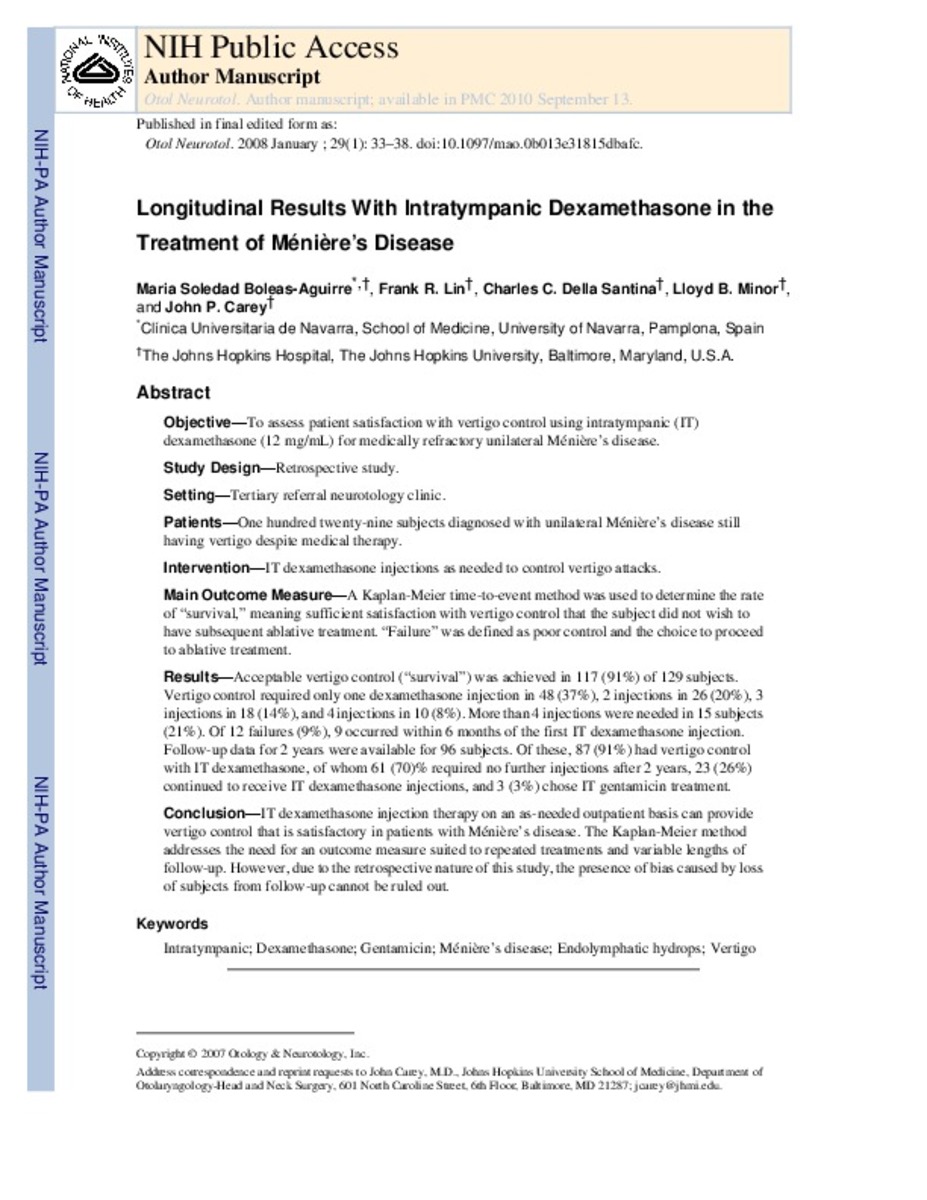Full metadata record
| DC Field | Value | Language |
|---|---|---|
| dc.creator | Boleas-Aguirre, M.S. (María Soledad) | - |
| dc.creator | Lin, F.R. (Frank R.) | - |
| dc.creator | Santina, C.C. (Charles C.) della | - |
| dc.creator | Minor, LL.B. (LLoyd B.) | - |
| dc.creator | Carey, J.P. (John P.) | - |
| dc.date.accessioned | 2012-06-12T18:01:17Z | - |
| dc.date.available | 2012-06-12T18:01:17Z | - |
| dc.date.issued | 2008 | - |
| dc.identifier.citation | Boleas-Aguirre MS, Lin FR, Della Santina CC, Minor LB, Carey JP. Longitudinal results with intratympanic dexamethasone in the treatment of Meniere's disease. Otol Neurotol 2008 Jan;29(1):33-38. | es_ES |
| dc.identifier.issn | 1531-7129 | - |
| dc.identifier.uri | https://hdl.handle.net/10171/22539 | - |
| dc.description.abstract | To assess patient satisfaction with vertigo control using intratympanic (IT) dexamethasone (12 mg/mL) for medically refractory unilateral Meniere's disease. STUDY DESIGN: Retrospective study. SETTING: Tertiary referral neurotology clinic. PATIENTS: One hundred twenty-nine subjects diagnosed with unilateral Meniere's disease still having vertigo despite medical therapy. INTERVENTION: IT dexamethasone injections as needed to control vertigo attacks. MAIN OUTCOME MEASURE: A Kaplan-Meier time-to-event method was used to determine the rate of "survival," meaning sufficient satisfaction with vertigo control that the subject did not wish to have subsequent ablative treatment. "Failure" was defined as poor control and the choice to proceed to ablative treatment. RESULTS: Acceptable vertigo control ("survival") was achieved in 117 (91%) of 129 subjects. Vertigo control required only one dexamethasone injection in 48 (37%), 2 injections in 26 (20%), 3 injections in 18 (14%), and 4 injections in 10 (8%). More than 4 injections were needed in 15 subjects (21%). Of 12 failures (9%), 9 occurred within 6 months of the first IT dexamethasone injection. Follow-up data for 2 years were available for 96 subjects. Of these, 87 (91%) had vertigo control with IT dexamethasone, of whom 61 (70)% required no further injections after 2 years, 23 (26%) continued to receive IT dexamethasone injections, and 3 (3%) chose IT gentamicin treatment. CONCLUSION: IT dexamethasone injection therapy on an as-needed outpatient basis can provide vertigo control that is satisfactory in patients with Meniere's disease. The Kaplan-Meier method addresses the need for an outcome measure suited to repeated treatments and variable lengths of follow-up. However, due to the retrospective nature of this study, the presence of bias caused by loss of subjects from follow-up cannot be ruled out. | es_ES |
| dc.language.iso | eng | es_ES |
| dc.publisher | Lippincott, Williams & Wilkins | es_ES |
| dc.rights | info:eu-repo/semantics/openAccess | es_ES |
| dc.subject | Intratympanic | es_ES |
| dc.subject | Dexamethasone; | es_ES |
| dc.subject | Gentamicin; | es_ES |
| dc.title | Longitudinal Results With Intratympanic Dexamethasone in the Treatment of Ménière’s Disease | es_ES |
| dc.type | info:eu-repo/semantics/article | es_ES |
| dc.relation.publisherversion | http://www.ncbi.nlm.nih.gov/pmc/articles/PMC2937266/pdf/nihms-42177.pdf | es_ES |
| dc.type.driver | info:eu-repo/semantics/article | es_ES |
Files in This Item:
Statistics and impact
Items in Dadun are protected by copyright, with all rights reserved, unless otherwise indicated.






